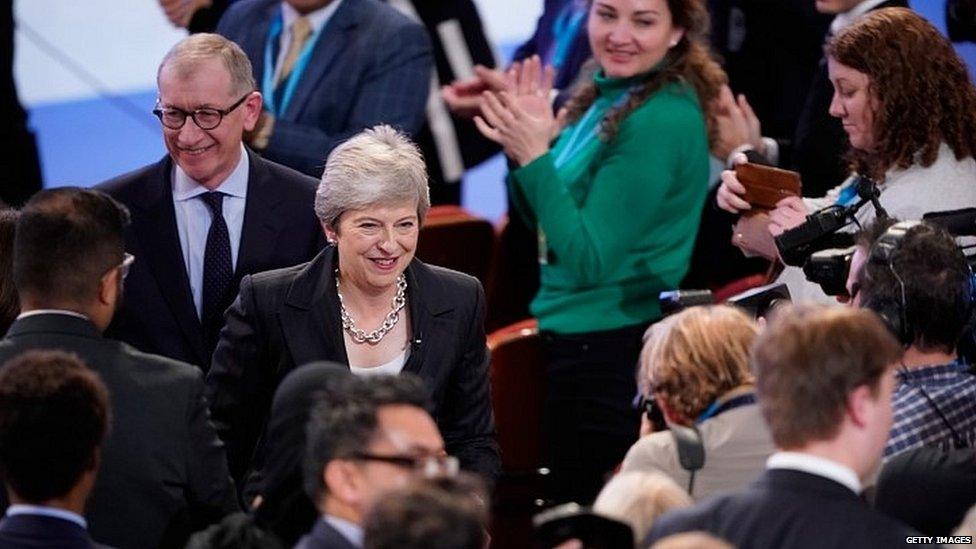May the moderate looks beyond Brexit
- Published

"Waited 12 months for that", the prime minister's chief of staff, Gavin Barwell, has just tweeted.
That's both a compliment to his boss, and a revelation perhaps too.
With the complexities of Brexit, the divisions in her party, the calamity of last year's conference speech, the antics of the former foreign secretary, and of course, her own fragilities, Theresa May has struggled to find her voice - and that's got nothing to do with running out of Strepsils.
Well today she found it, and in the words of one of her cabinet colleagues, not a particularly close ally, "she found her mojo".
From the moment she danced on to the stage - who would have thought we'd ever see that - she looked comfortable in her own skin, actually happy to be there.
It sounds strange, but it is so rare to see her overtly enjoying her job.
On so many occasions the public has seen a politician who seems constricted, conflicted, and ill-at-ease. For voters, frankly, if she doesn't look like she is enjoying being prime minister, why should any of us be happy about the fact she's doing it.
Beyond the vital dynamics of the hall, there was a consistent message - this was May the moderate of summer 2016, not May the leader cleaving to one side of her party, the Eurosceptics who have the power to unseat her. A message to her party and the country that in a time of some anxiety, huge uncertainty, and toxic politics, she'll chart a middle course.
There was a big claim that austerity was over. Given that Chancellor Philip Hammond has not got extra cash to throw around and is already looking to raise tax for the NHS, that was a bold claim that may come to haunt the government.
And a direct appeal to Labour voters, and indeed Labour MPs, who may be uncomfortable with the direction of Jeremy Corbyn's travel. Overtly centre-ground stuff, a pitch for an era after Brexit when, perhaps, perhaps, the tensions and bitterness of the last couple of years could fade. That is a big if.
This was a total contrast to last year's disaster. A good outing on the platform doesn't make any of Mrs May's enormous dilemmas disappear. Nor will it magic away the concerns and criticisms of her handling of Brexit.
There are restive forces in her party. She has no majority in Parliament. The Conservatives have huge questions they can't answer about who they are and what they are for.
The fact remains, many of her colleagues simply can't see her taking them into the next election. But Theresa May looks today less like a leader at the total mercy of events, more like a prime minister who knows what she wants and might, just might, have an idea how to get there.
- Published2 October 2018
- Published2 October 2018
- Published28 September 2018